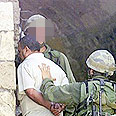
‘Human shield’ procedure banned
צילום: איי פי
‘Mother procedure’ needed
High Court’s ‘human shield’ ruling disconnected from reality
Several days after the High Court of Justice rejected the so-called “human shield” procedure employed by the IDF when apprehending terror suspects, an incident took place that demonstrated how disconnected the decision was from reality.
In a Yedioth Ahronoth story by Yossi Yehoshua and Ronny Shaked, we are told about IDF troops surrounding a building in the village of Dahariya, in the south Mount Hebron region, where wanted terror suspect Hisham Ismail Batat was hiding.
As the incident took place after the advance warning procedure was rejected by the court, the IDF could only call on residents, via megaphone, to evacuate the house.
Shortly thereafter, a bulldozer began razing the structure, when suddenly the suspect’s mother burst in and asked to talk to him. IDF commanders allowed her to go into the military jeep, where she grabbed hold of the megaphone and asked her son to turn himself in to avoid being killed.
The suspect was convinced by his mother, left the house, threw away his gun, and turned himself in. Before he was arrested, his mother was allowed to hug and kiss her son.
Did IDF troops conduct themselves in accordance with the law? I would like to believe the answer is positive. Yet those who examine the High Court decision may reach a different conclusion.
Question of consent
The advance warning procedure was rejected because the court questioned the free will of a neighbor asked to tell a terror suspect he should surrender. In the words of Judge Beinish: “The validity of consent is conditioned on it being given out of one’s free will. When a local resident is asked by a military commander, accompanied by armed forces, to assist in an operation against a population he is a part of, then even if this is done for a desired end, he has no real choice to refuse the request, and therefore such consent is no consent.”
According to such logic, under no circumstances can a Palestinian assist such operation out of his or her own free will, even in the case of a mother seeking to spare her son’s life. But what’s the law when the mother is not asked, but rather, does it out of her own initiative?
Such possibility was apparently not foreseen. Chief Justice Barak even stressed the ban on using residents as part of the army’s military effort, and added that “as a rule, he (the local resident) is not allowed to renounce his rights as accorded by humanitarian law (see clause 8 of the Fourth Geneva Convention…)”
The High Court’s conclusions are therefore as follows: First, even though it is clear the terror suspect’s mother not only agreed to go into the army jeep and call on her son to turn himself in, she even asked to do so. Yet according to Beinish’s decision, it is not at all clear whether such consent is indeed consent.
Secondly, by the force of international law, as interpreted by the High Court, the arrest operation was part of a military effort. The suspect’s mother’s had the right to refrain from taking part in the operation and not call on her son to turn himself in. Moreover, she was not allowed to renounce this right.
According to this logic, the mother’s entry into the military jeep and the permission granted to her to use the megaphone violated international law.
But is this how we should view the conduct of IDF troops who allowed a mother to save her son from death?










